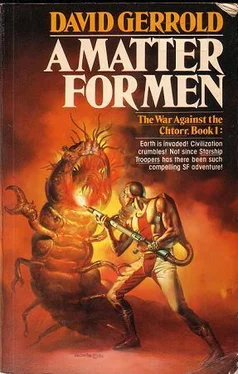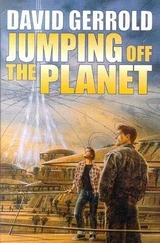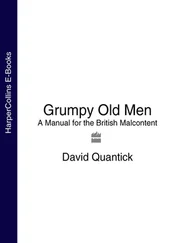David Gerrold - A Matter for Men
Здесь есть возможность читать онлайн «David Gerrold - A Matter for Men» весь текст электронной книги совершенно бесплатно (целиком полную версию без сокращений). В некоторых случаях можно слушать аудио, скачать через торрент в формате fb2 и присутствует краткое содержание. Год выпуска: 1983, Жанр: Боевая фантастика, на английском языке. Описание произведения, (предисловие) а так же отзывы посетителей доступны на портале библиотеки ЛибКат.
- Название:A Matter for Men
- Автор:
- Жанр:
- Год:1983
- ISBN:нет данных
- Рейтинг книги:4 / 5. Голосов: 1
-
Избранное:Добавить в избранное
- Отзывы:
-
Ваша оценка:
- 80
- 1
- 2
- 3
- 4
- 5
A Matter for Men: краткое содержание, описание и аннотация
Предлагаем к чтению аннотацию, описание, краткое содержание или предисловие (зависит от того, что написал сам автор книги «A Matter for Men»). Если вы не нашли необходимую информацию о книге — напишите в комментариях, мы постараемся отыскать её.
A Matter for Men — читать онлайн бесплатно полную книгу (весь текст) целиком
Ниже представлен текст книги, разбитый по страницам. Система сохранения места последней прочитанной страницы, позволяет с удобством читать онлайн бесплатно книгу «A Matter for Men», без необходимости каждый раз заново искать на чём Вы остановились. Поставьте закладку, и сможете в любой момент перейти на страницу, на которой закончили чтение.
Интервал:
Закладка:
"How big the government gets depends on how many agreements you make. If enough people agree, we'll build some buildings and hire some people to work in them and manage the agreements for us. Now, here's the question-how do you know if something is the business of the government or not?-that is, the business of the people we've hired to work in our buildings and manage our agreements for us. How do they know what to manage? What's the test?
"No-put your hand down. It's too simple. A person, place, or thing is in the jurisdiction of a government if it tests that government's agreements. If it doesn't, it isn't.
"The government doesn't have to manage the people who keep the agreements. They don't need managing. They're being responsible. It is the business of the government to manage those people who test the agreements. This is it. The whole of government consists of the art of managing people to keep the agreements-especially those who do the managing."
Whitlaw moved thoughtfully to the back of the room. He sounded as if he were speculating idly aloud. "Now ... management is decision-making, right? Anyone not see that? So, the question is-what are the guidelines by which the managers make their decisions? What is the meter-stick?" He looked around at us.
Marcie something-or-other: "The agreements, of course. The rules."
Whitlaw snorted. "Not bloody likely. The rules are just the context-the authorization for the decisions. In fact, the history of this nation is about men and women not following the rules. History is a list of who tested what agreements.
"Every time an agreement is tested, the person whose responsibility that agreement is, is also being tested. So, what does that person use for guidelines?-particularly when there are no guidelines! What is the source of that person's choice?" Whitlaw shoved his hands into his jacket pockets and turned slowly around, making sure we were all paying attention. When he spoke, his voice was low and quiet. "The truth is that ultimately every single choice ... is a reflection of the integrity of the individual making it."
"You might want to notice that-that everything we've done in this country, everything that we've accomplished-good or bad -in nearly two and a half centuries, has been done out of the integrity-or lack of integrity---of people like ourselves who are willing to make decisions and be responsible for them, especially when they know those decisions will be unpopular."
I wondered what he was working toward. He wandered back to the front of the room and sat down on his desk, facing us with an anticipatory expression on his face.
"Do you think the Moscow Treaties were fair?" he asked abruptly.
The class was divided. Some thought yes, some thought no. Most weren't sure.
Whitlaw said, "Well, let's look at it from the rest of the world's point of view. How do you think we looked to them?"
"We're the home of the free, the land of the brave-all the refugees come here." That was Richard Kham Tuong. He had almond eyes, brown skin and curly blond hair. He said it proudly. "People come here looking for freedom. We're a source of hope."
"Uh huh," said Whitlaw, unconvinced. He stood up and strode casually back to stand directly in front of Richard Kham Tuong. "Let me run some statistics by you. One half of the world's population goes to bed hungry every night. There are nearly six billion people on this planet-but the three hundred million who are lucky enough to live in the United States consume one-third of the planet's resources every year. For most of the last century, it was closer to one-half, by the way. Do you think that's fair?"
"Uh . . ." Richard recognized that as a loaded question and did the only thing he could. He stalled.
"Or let me try it another way," Whitlaw went on. He was sandbagging Richard now; we all knew it. "Suppose we order a couple of pizzas for this class. There are twenty-two very thin slices in a pizza, so there should be just enough for everybody to have a little bit. But when they arrive, I take fifteen of the slices for myself and leave the rest of you to fight over what's left. Is that fair?"
"You're loading the question, sir. Obviously, the way you say it, it's not fair."
"Well, what do you think we should do about it?"
"Everything we can, I guess."
"All right. Let's see. Are you willing to give up all of your clothes except what you're wearing now? Are you willing to survive on one meal of rice and beans per day? Are you willing to give up your automobile? And all use of electricity? Because that's the kind of sacrifice it would take-every single American would have to give up that much before we would be able to start paying back our debt to other nations. Are you ready to agree to that?"
There was silence in the classroom. Nobody wanted to be the first to admit it.
"It's all right," encouraged Whitlaw. "You'll notice I'm not ready to go hungry either."
"Okay, so we're selfish-what's the point?"
"That is the point. That's how we look to the rest of the world. Like pigs. Rich and fat and selfish. Let's go back to the pizza analogy. Here I am sitting with my fifteen slices. Are you going to let me get away with it?"
"Of course not."
"Then you think you're justified in restricting me?"
"Of course."
"All right, now you understand part of what the Moscow Treaties were about. Yes, there was a war-and the Moscow Treaties were aimed at the causes of it. A very large part of it was the perception that the United States had been selfish with the world's resources."
"Wait a minute!" Paul Jastrow said. "That's only in the eyes of the other nations. There's another side to that argument, isn't there?"
"I don't know," Whitlaw said innocently, his blue eyes twinkling. "Is there? You tell me."
Paul Jastrow sat down, frowning. He had to think about this. Joey Hubre raised his hand. "Sir, I read somewhere that the problems that the United States has been experiencing for most of our history have been the problems of success, not failure."
"So?"
"Well ... I mean, um, I hope I get this right. The article said that the size of a success is proportional to the amount of energy invested, and that all of the technological advances that have occurred in this country could have only occurred because of the huge amount of resources available to apply to the problems."
"And-?"
"Well, the point was that this justified our prodigious energy appetite. You have to put fuel in the jet if you want it to go. The other nations in the world have benefited from our advances. They can buy the fruits of the technology without having to invest in all the research. Um, the article used energy satellites as the example. A poor nation-a landbound one-doesn't have to develop a whole space program to have an energy station in space. They can buy one from us for only two million caseys. It was the United States that spent billions of caseys developing the industrial use of space, but everybody benefits."
"I see-and that justifies it?"
"Would it have been better for us to have spent that money on food for the poor? We'd still have lots of poor people today, but we wouldn't have energy stations in space. And those energy stations may eventually make it possible for poor nations to feed all their people."
Whitlaw kept his face blank. "If you were one of those poor people, Joey, how would you feel about that? No, let me be even more graphic. If you were a poor farmer, and your wife and three children were so malnourished that together the five of you weighed less than a hundred kilos, how would you feel about that?"
"Uh . . ." Joey sat down too.
Where was Whitlaw going with this? A lot of people were starting to get angry. Were we wrong for enjoying what we had? Paul Jastrow spoke up for all of us. He was slouched low in his chair and had his arms folded angrily across his chest. "It's our money," he said. "Don't we have the right to say how we want to spend it?"
Читать дальшеИнтервал:
Закладка:
Похожие книги на «A Matter for Men»
Представляем Вашему вниманию похожие книги на «A Matter for Men» списком для выбора. Мы отобрали схожую по названию и смыслу литературу в надежде предоставить читателям больше вариантов отыскать новые, интересные, ещё непрочитанные произведения.
Обсуждение, отзывы о книге «A Matter for Men» и просто собственные мнения читателей. Оставьте ваши комментарии, напишите, что Вы думаете о произведении, его смысле или главных героях. Укажите что конкретно понравилось, а что нет, и почему Вы так считаете.












